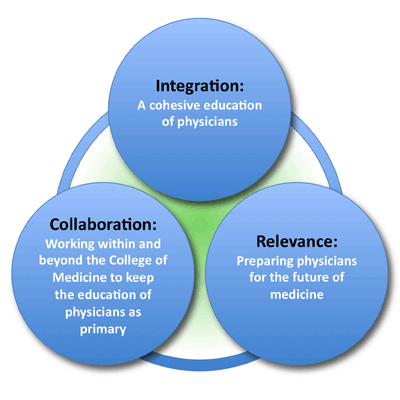Integrated Pathways Curriculum

Principles and Goals of Curriculum
Principle of Integration
Curricular material is integrated within and between all four years of the curriculum while threading both clinical and basic science throughout the four years. Students experience the curriculum as an integrated whole. The curriculum explicitly defines learning outcomes and competencies that can be measured. These outcomes and competencies reflect a building of attitudes, knowledge, and skill level across the four years so that students’ progress along a continuum of depth of understanding of content and the adoption and mastering of skills. Our integrated curriculum welcomes every student into the profession of medicine on day one, and the values and behaviors we desire of our graduating students will be cultivated by our faculty and medical educational program. We make every effort to assure every student becomes the best physician possible.
Principle of Collaboration
Collaborative efforts involve faculty and staff from all areas of the College, our affiliates, our students, and important organizations such as the Alumni Association and other academic organizations. This effort will continue as the curriculum responds to changes in medical education. Collaborative teaching and learning are used across the curriculum.
Principle of Relevance
Medical science is rapidly changing and we are poised to identify and integrate, on an ongoing basis, new curricular materials that are relevant to training the best physicians. This means not only integrating new scientific knowledge and principles, but also assuring that we are training physicians with the skills they need to practice effectively in a changing health care environment. This includes such skills as the ability to work in teams and understand the health care system, practicing in a patient centered manner, and developing the ability to be a life-long learner who can evaluate and integrate new knowledge and skills throughout one's professional life.
Curriculum Delivery in Foundations: Instructional Design Drivers
- Competencies
- Student-directed learning
- Goals & learning objectives
- Problem-solving
- Clinical skills
- Teamwork
- Professionalism
Curriculum Delivery in Foundations: Methodologies
- Small group activities: Problem-Based Learning (PBL), Patient-Oriented Problem Solving (POPS), Clinical Skills (CS), Team-Based Learning (TBL), and Gross Anatomy and Histology/Pathology Labs.
- Lectures
- On-line modules